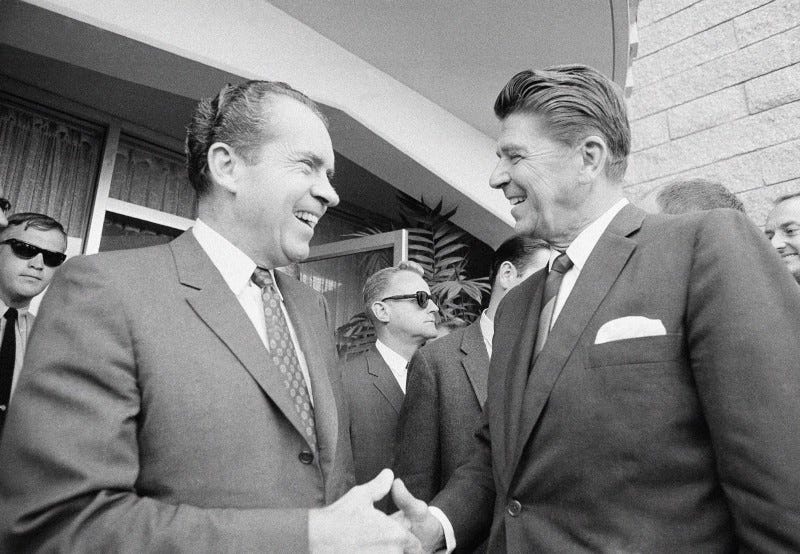Republican revisionism
At The Atlantic, Peter Beinart cynically reinterprets six decades of American politics.
At The Atlantic, Peter Beinart cynically reinterprets six decades of American politics.
Peter Beinart’s latest article at The Atlantic is entitled “Republican is not a synonym for ‘racist.’” It’s a bold statement in the age of Donald Trump — and if it sits poorly in your mind, that’s because the premise is wrong. Don’t let Beinart fool you. He’s a political scientist, not a historian, and it shows. Beinart can pretend there’s no connection between the GOP and white racial resentment in America, but the past six decades paint a different picture.
The Republicans and the Democrats realigned along the principles behind the Civil Rights Movement in the 1960s. The GOP took the side of the white backlash to integration — formerly the ideological home of the southern wing of the Democratic Party.
Richard Nixon was the first Republican to use the post Civil Rights era racial realignment to gain the presidency in 1968. He did so in large part by taking advantage of the anger white Americans had against a system that no longer gave them pride of place. Nixon learned from Barry Goldwater’s loss in 1964 to Lyndon Johnson that the secret to electoral success in America while you stoke the fires of white resentment is to never say the quiet part loud.
The “silent majority” that Nixon appealed to in his quest to restore “law and order” understood full well that their silence was based on their whiteness and that the subjects of the law and order campaign were people that didn’t look like them. Nixon resigned in disgrace less than half way through his term, but the lessons from his campaigns had been learned.
Years later, in 1980, Ronald Reagan made an appearance at the Neshoba County Fair, only seven miles away from the site of a prominent murder of civil rights activists in Philadelphia, Miss. It was a campaign event where he delivered a speech about “state’s rights”, Goldwater’s turn of phrase from 16 years earlier that described resistance to civil rights legislation in the south. It wasn’t a dog whistle. It was a klaxon.
Beinart believes that “race often distorts” how conservatives see government programs — but the bemusement in Beinart’s piece rings a little false. Reagan perpetuated the myth of the welfare queen, a grotesque racial caricature of an African American woman driving a Cadillac and having as many children as possible to live off taxpayer dollars, throughout the late 1970s and 1980s. Beinart is a political scientist: he should know the origins of these right wing beliefs. If he does know, though, he’s keeping that information locked away.
When conservative politicians talk about reducing “dependency” on government, they usually mean reliance on programs like food stamps, Temporary Assistance for Needy Families, housing assistance, and Medicaid, all of which disproportionately benefit African Americans.
The next two decades were more of the same. George H.W. Bush’s Willie Horton ad; the Congressional GOP’s winking at the militia movement in the 1990s; George W. Bush’s indifference toward Hurricane Katrina in the 2000s — they continued the alliance between the racist right and American conservatism. And the years of feeding the fires of white rage finally paid off.
During the 2016 GOP primary, candidate Donald Trump’s affiliation with the extreme, racist right was well known. It wasn’t a secret. His opponents pushed back against the candidate’s language, but Trump knew the party better than they did. Years of feeding the fire of white rage had created a base of support for a man whose presidential campaign was built on white supremacist ideation.
Today Trump is the president, having won on a platform of anger, resentment, and hate. Beinart admits as much in his piece.
American debates over race, gender, sexuality, and religion have become as noxious as they are because Donald Trump took risks. By nakedly appealing to white rage and fear, he risked alienating moderate voters. His risks paid off.
Yet now, Beinart argues, the onus for healing the rift between the right and the left is on the latter. Conservatives won’t fix the problems their policies cause for minorities, says Beinart, without liberals first avoiding the word “bigotry” when describing the right wing.
But the Republican Party has been the party for white anger for over half a century. It’s well past time liberals confront and accept that fact instead of delivering meaningless platitudes while the right reaps the electoral benefits of their politicians’ incendiary rhetoric.
Like my work? Please consider supporting me via my Patreon. $5 a month gets you essays, reading lists, and more.




